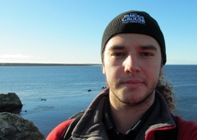Falklands biodiversity research

Andrew Mathews has been studying for the MSc in Managing the Marine and Freshwater Environment
27 November 2013
Aberystwyth University postgraduate student Andrew Mathews has taken part in a research project that could assist the Falkland Islands Government to manage and conserve its marine life.
Andrew is the son of a Falklands war veteran and in his final year at IBERS studying for an MSc in Managing the Marine and Freshwater Environment.
He spent the Summer of 2013 studying shallow marine life, specifically in Adventure Sound– a bay on the south east side of East Falkland.
Andrew participated in a study led by Dr Paul Brickle, of the recently established South Atlantic Environmental Research Institute (SAERI) based in the Falkland Islands.
SAERI’s remit is to combine the research efforts, from all fields of science, undertaken in all Southern Atlantic British Overseas Territories.
As well as the Falkland Islands, this includes St Helena, Ascension Island, Tristan de Cuhna, South Georgia, and the South Sandwich Islands.
Andrew’s work was mainly funded through a £2000 grant given by the Shackleton Scholarship Fund, with a £300 contribution from WAC (Welfare and Celebration Club Awards Committee).
The study aims to generate baseline data (a clearly defined starting point) to be used to better inform both SAERI and the Falkland Islands Government in the management and conservation of its shallow marine habitats in a scientifically informed manner.
As part of the project Andrew analysed over 500 photographs of samples taken by members of the Shallow Marine Surveys Group (SMSG), a marine ecology group based in the Falklands, using statistical techniques which have not been used in this context in Adventure Sound before.
Photographic software was then able to determine the percentage area coverage and density of various marine flora and fauna from a wide range of environmental conditions.
Dr Pippa Moore, IBERS Lecturer in Aquatic Biology said; “The research Andrew has undertaken provides significant insights into the biodiversity of the poorly studied shallow-water marine systems of the Falkland Islands and as such provides context for SAERI to establish long-term monitoring of this potentially fragile environment.
“Our masters degree in Managing the Marine Environment provides students with the skills and confidence to undertake internationally important research and Andrew’s endeavours provide support for this.”
Analysis of this data supported existing knowledge of the community structure of the Falkland Island’s shallow marine habitats which are currently experiencing increased interest due to various forms of resource extraction, including oil.
Though it had long been suspected there were large oil reserves around the islands, exploration has happened during the last three years, and Andrew’s work will aid the greater understanding of the functionality and structure of the ecology of these habitats and the possible effects from oil exploration and extraction.
The Falkland Islands would benefit directly from Andrew’s research as this baseline data would allow any alterations, due to these extractions, to be compared to a strong base data set.
Andrew said; “The results of my research would allow for rapid detection of any impacts these practices may potentially bring about and relevant management measures could be implemented before irreparable damage could occur. In light of these potential threats, this work is essential for the conservation of the shallow marine environment.
In addition, this work contributes to both of the priority areas within the Government’s Falkland Islands Biodiversity Strategy.”
Dr Paul Brickle from SAERI said; "It was fantastic to have a student from Aberystwyth working in the Falkland Islands. One of SAERI’s objectives is to mentor and provide for students in the South Atlantic. The work completed will certainly help with an understanding of coastal marine ecology around the Falkland Islands."



